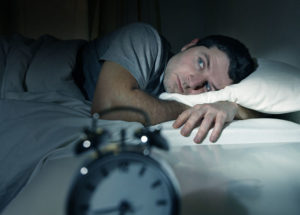Sleeping Conditions: Sleep Apnea & Insomnia
Sleep disorders are a really common health issue in America that are not often talked about, at least in terms of a serious medical condition. We will often hear a family member, a co-worker or even ourselves talk about how little sleep we got that night or, “I just feel so tired and foggy today”. With the person on the receiving end “prescribing” more caffeine or maybe a nap. And even though we have it drilled into us that we need at least 8 hours of good rest to function, the numbers indicate we aren’t getting it.
With more than 22 million Americans suffering from sleep apnea (over 80% of sleep apnea cases are undiagnosed), one in four Americans suffering from insomnia every year, and 35% of the population getting less than the recommended 8 hours, sleeping seems to be elusive to the American population.
And, while many of us know how important sleep is to our daily lives, with so many potential factors contributing to sleep conditions, it’s difficult to know where to begin to reclaim a healthy sleeping pattern without the help of a professional. That’s where we come in.
As integrative medical providers in Oak Brook, IL, our focus is not on just handing you over a sleeping pill or CPAP machine to improve your sleep. We want to understand WHY you’re not sleeping as well as you could, and which methods of treatment we can implement that will profoundly improve your sleep and increase vitality.
Several factors can impact our sleep, everything from too much caffeine, hormones, diet, to changes in your daily habits and routines can affect your sleep patterns. Read on to learn more about signs that may indicate you’re not getting enough sleep, factors that may be contributing to your lack of sleep, and how improving your sleep hygiene can help you get more Z’s.
Signs You’re Not Getting Enough Sleep
The following are common indicators that you’re not getting enough sleep. It’s important to note that this list may be different for some depending on their sleeping condition and the severity of the disorder:
- Difficulty falling and/or staying asleep
- Irritability, anxiety, or mood swings
- Feeling “foggy”, general lack of concentration
- Difficulty remembering
- Depression
- Having the urge to take naps during the day or napping during the day
- Daytime fatigue
- Weight gain or loss
- High blood pressure
- Sexual dysfunction
Reasons Why You May Not Be Getting Enough Sleep
When sleep conditions, such as sleep apnea or insomnia (especially chronic insomnia) occur it is often the sign of an underlying health condition. Oftentimes, environmental factors and hormones, as well as some lifestyle choices are large factors in mild to severe sleeping conditions. Here are some of the main causes and increased risk factors for sleep apnea and insomnia:
Sleep Apnea
- Having a small upper airway or large tongue, tonsils or uvula
- Being overweight
- Having a recessed chin, small jaw, or large overbite
- Having a large neck (17 inches or more for males, 16 inches or more for females)
- Smoking
- Alcohol consumption (especially before sleeping)
- Being over 40 years old
- Ethnicity (African-Americans, Pacific-Islanders and Hispanics)
- Genetics
Insomnia
- Medical Conditions such as chronic pain, chronic fatigue syndrome, arthritis, asthma, sleep apnea, acid-reflux disease, and hyperthyroidism.
- Hormones, including Estrogen, pregnancy hormones, and hormonal shifts during menstruation
- Psychological issues such as depression, anxiety, bipolar disorder, or psychotic disorders.
- Circadian rhythm disruptions like changes in schedule, high altitudes, extreme changes in temperature, jet lag, environmental noises.
- Other factors that cause insomnia include stress, changes in diet, stimulant use, sleeping next to a snoring partner, and an overactive mind.
An Integrative Medicine Approach To Treating Sleeping Conditions
Often when you go to a conventional medical doctor, he or she will go over your symptoms and describe a treatment based on your answers to a series of questions and any diagnostic tests that they run. On the other hand, when you consult with an integrative medical provider in Oak Brook, we work with you to find the ROOT cause or causes of your sleeping condition and design a treatment program that gives you an active role in your health, while providing you with the necessary tools for optimal and lifelong wellness.
Regardless of where you fall on the spectrum of sleeping disorders or how severe or mild your sleeping condition may be, making lifestyle changes and improving sleep hygiene are the main components of our holistic approach. We work to create actionable steps that will help you get and stay asleep better than before*.
These habits will improve your sleep, your health, and will create more balance in your life. Here are just a few sleep hygiene habits and lifestyle changes that have been proven to effectively improve sleep quality:
- Shut down electronics and bright lights at least an hour before bed. Lights and electronics are stimulating to the brain and can stop the production of melatonin (the hormone that regulates sleep).
- Avoid consuming alcohol within three hours before sleep. Alcohol also increases the level of wakefulness during the last half of the night when consumed in high doses.
- Avoid consuming caffeine in the evening and afternoon. Even though you think the effects of caffeine have worn off, it may take five to six hours for the stimulant to wear off completely.
- Exercise. Exercising regularly has been proven to improve sleep quality in adults. Aim for 30 minutes a day, five days a week of moderate to vigorous exercise during the day time. Unwind before bed with gentler exercises such as Tai Chi or Yin Yoga.
- Create a Bedtime Routine. Developing a bedtime routine helps to let your body know it’s time to wind-down. Bedtime routines are extremely personal and should be designed to relax you. If drinking tea and journaling before bed relaxes you, go for that. Maybe gentle stretching while listening to peaceful music or guided meditation is more your style. Whatever you choose, try and stick to doing it at around the same time each night so that your body begins the process of preparing for sleep automatically.
If you are having trouble sleeping or showing signs of sleeping condition and would like the experience of working with an integrative medical provider, contact Vitality Family Health in Oak Brook, IL today.
*Depending on the severity of your sleeping condition, medications, supplements, or sleeping devices, such as a mouth guard or CPAP machine may be recommended along with lifestyle and sleep hygiene change.



